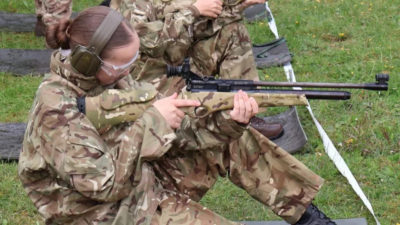‘Targeted messaging’ in schools about armed forces careers not for the ‘well-being’ of students
ForcesWatch Comment
Schools Week are today reporting that the Ministry of Defence requested access to the National Pupil Database. The request was for the most sensitive pupil data. The request was refused by the Department for Education. The evidence is in that the armed forces already visit schools for recruitment purposes so we ask why, if ‘targeted messaging’ in schools about armed forces careers is not for the ‘well-being’ of students, are they allowed to visit schools with their recruitment agenda at all?
The MoD’s request for sensitive data from the National Pupil Database was refused by the Department for Education. The evidence is in that the armed forces already visit schools for recruitment purposes so we ask why, if ‘targeted messaging’ in schools about armed forces careers is not for the ‘well-being’ of students, are they allowed to visit schools with their recruitment agenda at all?
Schools Week are today reporting that the Ministry of Defence put in a request to the Department for Education for access to the National Pupil Database. The request was for the most sensitive pupil data which includes full name, address, date of birth, ethnicity, special educational needs, personalised exclusion and absence figures, as well as whether they receive free school meals and details of their academic progress.
The MoD state that the purpose of their request was: ‘To determine if we can use targeted messaging to better inform young people of the career opportunities open to them in the Army (Regular and Reserve) so that their decisions about seeking a full or part time job are better informed.’
The MoD work closely with the DfE, for example, in its promotion of the cadet forces in schools and the recent pro-military ‘learning resource’, both of which are partly about promoting a career in the armed forces. The DfE also allows armed forces visits to schools which, as the evidence suggests, are largely about recruiters gaining access to young people. Yet this request was rejected by the DfE because it was not for educational purposes or for the ‘well-being’ of students. This suggests how unacceptable direct and undisguised marketing by the armed forces to certain groups of students would be. It would certainly have made the DfE’s promotion of ‘military ethos in schools’ more tricky to sell as purely in the best interests of young people.
The MoD are claiming that the application was ‘made in error’ and is ‘not in line with Army policy’ but, as Schools Week point out, the amount of work necessary for such as application is significant, suggesting that the ‘error’ was in fact an attempt worth trying. They also state that, ‘The Army does not target individual pupils for recruitment purposes’ yet the data requested includes identifiers such as name and address. This was an attempt to systematise the targeting of individuals that happens on an informal basis at the moment once the armed forces have gained access to a school; for example, those who show an interest are encouraged to go on an Insight course to give a (very partial) flavour of Army life.
That the Army would have used the data to, at the very least, identify particular schools to target their ‘messaging’ around careers, is just another indication that long-term recruitment is the main purpose for visiting schools and that the denial that such visits are for recruitment purposes is a cynical economy with the truth. This denial relies upon a definition of recruitment as signing people up on the dotted line there and then rather than the long-term process of softening them up and gaining interest that it actually is. See our briefing on The recruitment agenda behind the UK armed forces’ ‘engagement’ with students in schools and colleges for details, including official documents that betray the MoD’s public denial. If the MoD’s request had been successful, this denial would have been impossible to maintain.
We ask why, if ‘targeted messaging’ in schools about armed forces careers is not for the ‘well-being’ of students, are they allowed to visit schools with their recruitment agenda at all?
See more: military in schools/colleges, recruitment, education
Like what you read?
> Sign up for our newsletter or blog notifications
> Support our work – from just £2 a month










